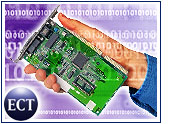
Three technology giants — IBM, Sony and Toshiba — today took the wraps off of their jointly developed, much-hyped “Cell” chip, which the companies claim to be “effectively a supercomputer on a chip.”
A prototype was unveiled today at the International Solid State Circuits Conference in San Francisco. It integrates 234 million transistors, measures 221 millimeters across, and is built with 90-nanometer fabrication. Capable of supporting multiple operating systems — including Linux and real-time systems used for home media applications — each chip has eight processors capable of clock speeds of 4 GHz or faster.
Although industry analysts said the supercomputing claims were simply marketing, they did call attention to the more powerful parallelism represented by the multicore Cell, which will be targeted at home digital media applications such as graphics and video. The chip also is expected to power the next generation of Sony’s gaming console, the PlayStation3.
New Design, New Era
IBM, Sony and Toshiba touted the Cell as an ideal technology for home media applications such as digital televisions and home servers. The three companies said Cell’s architecture would give the microprocessor, which was developed at a collaborative center in Austin, Texas, “supercomputer-like” floating point performance while achieving clock speeds beyond 4 Ghz.
The companies also highlighted Cell’s floating point processing capabilities, which come from its multicore design.”Today we see the tangible results of our collaboration: an open, multicore microprocessor that portends a new era in graphics and multimedia performance,” said a statement from William Zeitler, senior vice president and group executive of IBM’s Systems and Technology Group.
Masashi Muromachi, Toshiba semiconductor president, said that in addition to home entertainment and consumer devices, the Cell chip would prove useful in industrial systems.
’70s Supercomputer on Chip
Martin Reynolds, Gartner research vice president, told TechNewsWorld that while Cell may mean a dramatic bump in performance through a scalable, parallel processing system, it is not the supercomputer on a chip that the companies claim it to be.
“Maybe a supercomputer from the 1970s on a chip,” Reynolds said. “If you look at supercomputers today, you’ll see that a single chip is not a valid replacement. To some extent, supercomputers are bounded by their size — as much processing as you can stuff into the cabinets. So maybe Cell would make a nice supercomputer chip — we will have to wait, though.”
Reynolds added that initial devices using the Cell will be targeted at media and graphics, which lend themselves to parallel processing.
“That is why the initial target is consumer devices,” he said. “It isn’t clear that these devices will ever have a place in business systems, which typically do not require rich media.”
Matter of Apps
Reynolds said the biggest challenge for the Cell chip backers will be in finding and developing applications for it.”If it cannot run general purpose applications, it will always be confined to niche markets,” he said.
Dean McCarron, president of Mercury Research, told TechNewsWorld the Cell chip appears to be “tailor made” for home media tasks that can be easily divided and processed in parallel fashion.
McCarron said that 3-D graphics applications, for example, are ideal for such large-scale, distributed processing systems, and the latest development is focused on scaling through multiple pipelines.
McCarron also agreed, however, that applications for the Cell chip will not come easy, because programmers looking to take advantage of the technology will have to form a deep understanding of the new architecture.












































"It isn’t clear that these devices will never have a place in business systems, which typically do not require rich media." "If it cannot run general purpose applications, it will always be confined to niche markets," Said, Martin.
>
Martin … USA businesses in the past never needed many things (I guess, same today) …. Toshiba, IBM, and Sony (TIS) are smart for targeting the consumer market, because most of business (in general, last half of the 1900s) has proven that it is very incompetent at prescience of any sort.
>
Today USA businesses use all those things they did not need. The TIS great chip will have many applications in the business office. Just as Apple and Intel computer growth was stronger in the homes initially, then business management discovered from their worker-bees and mules using their home computers that a personal computer with word-processor/spreadsheet/email application allowed more work to be done correctly in far less time. Technology has provided for the past 25 years the greatest growth in employee productivity, GDP, and bottom line profit, because employees see the future frequently before business can fathom that something has changed (much less respond to change). Hardware and software companies (1950-2000) started in garages, on college campuses, …. Look at what colleagues and associates at MIT, CalTech, Stanford and others are doing today. GPL/GNU/Linux/… are developing new economic concepts globally with products, projects, and technologies that 99% of business managers and politicians cannot understand (beyond change is bad Luddite BS). US/EU, global business will always be the backseat pundit/drivers of our future.
>
Games and entertainment as production tools are in their nascent state, but (in 10 years or less) with science, engineering, economic/business modeling/simulations, virtual-reality for onsite learning environments, Avatar Populated Environment Simulations (APES) with mentors and antagonist, …. Waiting for business to move is like waiting for a wet-dream … go find it … spend some money … be more satisfied more often in reality. Business and their ivory towers … get out of them.
>
Anyway, tough-luck change continues beyond the control of business and government.